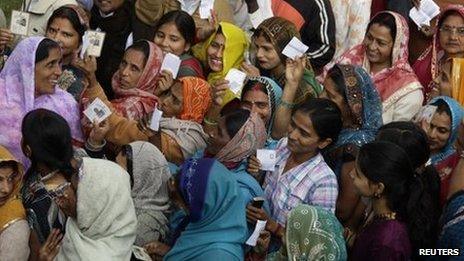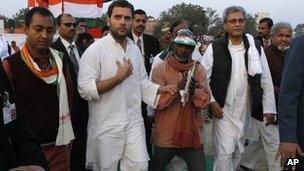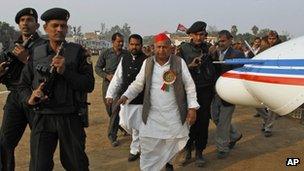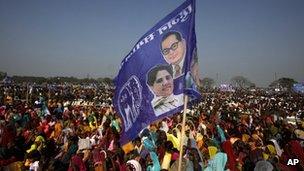High stakes for all players in Uttar Pradesh poll
- Published

Nearly 126 million people are registered to vote in the Uttar Pradesh state elections
The styles of the contending campaigners are contrasting, but the goal is the same - the capture of power in India's most populous state of Uttar Pradesh, where multi-stage elections could hold the key to national polls in 2014.
A lot is at stake for Rahul Gandhi, the fourth-generation scion of the Nehru-Gandhi dynasty; Mulayam Singh Yadav, the old warhorse of Uttar Pradesh politics; and Ms Mayawati, a champion of India's oppressed Dalit underclass and currently chief minister of the state.
As Rahul Gandhi's helicopter descends from the skies at one of his many campaign stops, several thousand people are waiting to see this aspirant for India's top job in the 2014 parliamentary elections.
But, here, in Morava village, just outside the state capital of Lucknow, Mr Gandhi is fighting a semi-final battle to the big game in 2014.
Even a moderate success in the Uttar Pradesh elections would mean that a tottering Congress party, which has been out of power in the state for more than 20 years, is seen flying its flag again.
Clad in a flowing white tunic and white pyjamas, Rahul is constantly rolling up his sleeves, signalling that he is in the thick of political battle.
His speech is direct, to the point and is aimed at Ms Mayawati, accusing the Bahujan Samaj Party (BSP) leader of pilfering money sent by the Congress-run government in Delhi for the poor in Uttar Pradesh.
"Where has all the money gone?" he asks the audience. He then answers his own question - the money from the central scheme has been eaten up by the "hathi" or elephant, the electoral symbol of the BSP.

Rahul Gandhi has found himself in the thick of a political battle
He scorns former chief minister and Samajwadi (Socialist) Party leader Mulayam Singh Yadav's promise of providing electricity to every household in this power-starved state.
There is the positive as well. The central government in Delhi has ensured that every unemployed person will get 100 days of employment a year at 120 rupees ($2.40, £1.54) per day.
The Congress party has also introduced a food security bill in parliament which, if passed, will provide 35kg of grain to every poor family in the country.
He repeatedly refers to the women at the rally. Clearly, he is confident that women will play a crucial role in how his party fares.
Many in the audience tell me that they are seeing Mr Gandhi for the first time. Others say they have come to not just see him but to hear him out.
But merely being present at the rally of a political leader does not mean that a vote for the party is guaranteed.
'No comment'
From the direct message of Rahul Gandhi, the scene in Chhibramau, Kannauj district, where Mulayam Singh Yadav is to speak, is quite different.
Local leaders heap praise on this veteran politician, and full-throated slogans in support of the party are the flavour of the day.

Mulayam Singh Yadav says he does not want to personalise the election
Unlike in Rahul Gandhi's rally, where security was heavy, Mr Yadav's rally is quite relaxed.
In his brief speech, the Samajwadi Party leader promises not just electricity but free treatment for those suffering from heart, kidney and liver-related illnesses.
And, to loud cheers, Mulayam Singh Yadav says he always implements what he promises.
Red-capped party supporters rush towards the man, only to be pushed back by the police.
Just before he boards the helicopter, I manage to ask him what he thinks about Rahul Gandhi and his campaign. "No," he says firmly, "I don't want to comment." I persist with my question, but he refuses to answer.
Careful politician that he is, Mr Yadav does not want to personalise the election especially since there is a possibility of the Congress and the Samajwadi Party forming an alliance government after the elections.
A warning
The third day of this election tour is reserved for a Mayawati rally. She is an unlikely woman politician who has risen to be chief minister. Unlike the other two, Ms Mayawati reads from a prepared text.

Mayawati warns her supporters that if they abandon her they will be responsible for her defeat
It sounds more like a sermon than a speech. She is speaking to her underclass Dalit electorate, which makes up 18% of the state's population. Ms Mayawati is speaking in Etawah, considered to be a stronghold of her political rival Mulayam Singh.
After a frontal attack on the central government for not providing her state with funds, Ms Mayawati does what Indian politicians do not often do. She sounds a warning - telling her flock that if they are misled by the propaganda of other parties they would be responsible for her defeat.
In a country, where politicians usually go around begging for votes, she is certainly different. Her supporters, often at the receiving end of upper caste anger, are also told that their women and daughters would not be safe if Ms Mayawati and party do not return to power.
Ms Mayawati is unfazed by the allegations levelled against her; and her confidence in her support base appears supreme. The crowd is large, many of them poor. Unlike in Mr Mulayam's rally in Chhibramau, there are many more women here in Etawah.
Much more than the fortunes of any party or individual leader are at stake here in India's most politically crucial state. The results of these elections could well set the course for the country's national politics for the next five years.
- Published4 February 2012
- Published15 February 2012
- Published8 February 2012
- Published29 December 2011